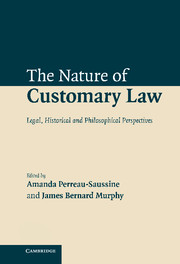Book contents
- Frontmatter
- Contents
- List of contributors
- Table of cases
- The character of customary law: an introduction
- Part I Custom and morality: natural law, customary law and ius gentium
- Part 2 Custom and law: custom, common law and customary international law
- 7 Custom in medieval law
- 8 Siege warfare in the Early Modern Age: a study on the customary laws of war
- 9 The idea of common law as custom
- 10 Three ways of writing a treatise on public international law: textbooks and the nature of customary international law
- 11 Custom, common law reasoning and the law of nations in the nineteenth century
- 12 Custom in international law: a normative practice account
- 13 Customary international law and the quest for global justice
- Index of names
10 - Three ways of writing a treatise on public international law: textbooks and the nature of customary international law
Published online by Cambridge University Press: 30 June 2009
- Frontmatter
- Contents
- List of contributors
- Table of cases
- The character of customary law: an introduction
- Part I Custom and morality: natural law, customary law and ius gentium
- Part 2 Custom and law: custom, common law and customary international law
- 7 Custom in medieval law
- 8 Siege warfare in the Early Modern Age: a study on the customary laws of war
- 9 The idea of common law as custom
- 10 Three ways of writing a treatise on public international law: textbooks and the nature of customary international law
- 11 Custom, common law reasoning and the law of nations in the nineteenth century
- 12 Custom in international law: a normative practice account
- 13 Customary international law and the quest for global justice
- Index of names
Summary
International law is a system of customary law. And, like all writers of textbooks on customary law, scholars of international law find themselves in a curious position: it is philosophically impossible to treat customary law as a system of clear, settled rules since there is no way of settling the correct text or formulation of those rules. As Brian Simpson writes in an essay on English common law,
we all know that no two legal treatises state the law in the same terms, there being a law of torts according to Street, and Heuston, and Jolowicz and James and the contributors to Clerk and Lindsell, and we buy them all because they are different. And what is true of the academics is true perhaps even more dramatically of the judges, who are forever disagreeing, often at inordinate length … As a system of legal thought the common law then is inherently vague; it is a feature of the system that uniquely authoritative statements of the rules which, so the positivists tell us, comprise the common law, cannot be made.
What is true of English law is at least as true of public international law, on which not only academics and individual judges but also tribunals and courts disagree, similarly often at inordinate length.
This essay argues that one of the most fundamental differences between various treatises on international law stems from diverging assumptions about what renders a statement of a rule of international law correct or authoritative.
- Type
- Chapter
- Information
- The Nature of Customary LawLegal, Historical and Philosophical Perspectives, pp. 228 - 255Publisher: Cambridge University PressPrint publication year: 2007
- 2
- Cited by



